
"Ask yourself whether you care for your saxophone or your trumpet as much as a human being can care for any inanimate object. For you must have the musical power to turn that instrument into something animate! It must be made to express whatever poetry of music you have in you . . . There's one thing besides musical excellence that requires stressing . . . And that's a well-rounded education. I don't mean merely the study of music theory and harmony . . . Anything that you can do to enrich that mind will help in the formulation of mature and interesting musical thoughts, adding depth to whatever you create." - Paul Whiteman
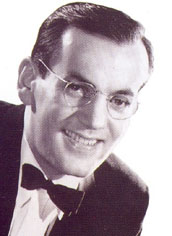
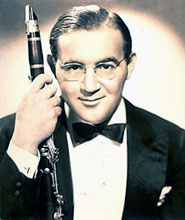
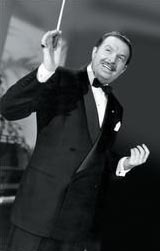
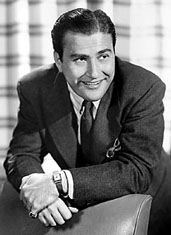
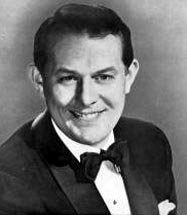

"Wherever possible, I feel the audience should be educated to a good leader's style rather than the leader catering down to the public's taste. However, this can't always be accomplished and the leader, therefore, must make some compromises. Any musical pioneering that a bandleader feels he must do can be sandwiched in between those numbers that the public wants and demands . . . Showmanship is important, but must not be forced and should be suitable to the leader's personality. Although an attractive appearance is an asset, I'm sure you and I can both recall many topnotchers who wouldn't win any ribbons in beauty contests." - Count Basie
"HOW TO BE A BANDLEADER"
quotes selected by Christopher Popa
"The mere thought of facing the audience instead of the music scared me half to death. I was a piano player fresh up from Washington, D.C., not a class valedictorian. One might as well have asked Demosthenes, the Greek orator, to perform a hot chorus on a lute. Terror that my mind might go blank almost sidetracked fourteen musicians . . . But it suddenly dawned on me that a bandleader must improvise many things besides hot choruses . . . Luck is everything, but it means nothing unless you're ready musically and morally to exploit it . . . My own conception of luck can be defined as follows: being in the right place at the right time doing the right things before the right people."
- Duke Ellington
"The top you're aiming at resembles a slippery cake of ice. Standing still for a moment results in a case of cold feet. Sit down even for a moment and the competition may freeze you out. Bask for an aimless hour in the sunshine of your glory-and that ice paradise melts right out from under you.
The trick . . . lies in keeping your balance. Only one person can make you lose it. That's yourself. For just when you're entrenched on the pinnacle, the boys who once hailed you as 'the greatest' . . . will suddenly cast around for new loves to champion . . . If at that moment I had believed in the critics more than what music meant for me, I might as well have packed my clarinet in mothballs for life." - Benny Goodman
"Speaking from personal experience, I've found that an orchestra leader has to be a business man, psychologist, host, talent scout and showman-all rolled into one. Running a band is a 24-hour-a-day job. A bandleader needs the heart of a hobo and more stamina than a gold rush pioneer . . . I consider good health a major requisite for anyone that wants to be a bandleader. I'm a sports enthusiast myself-tennis, golf, swimming, and horseback riding-and I've found that there's nothing better than outdoor exercise to develop coordination and general poise on a bandstand." - Vaughn Monroe
"The aspiring bandleader will soon learn that the quickest way to incur the public's displeasure is to ignore its requests for songs. He will learn that 80% of his success will depend on his ability to play the songs the public wants to hear. The remaining 20% will depend on his style, personality, the breaks and various other factors . . . As soon as I see that no one is getting up to dance or that there is a buzz of conversation around the room, I know they aren't listening and aren't even interested in what's being played. This, of course, is my cue to take the song out of my books." - Guy Lombardo
sources:
Barnet, Charlie with Stanley Dance. Those Swinging Years: The Autobiography of Charlie Barnet
(Baton Rouge, LA: Louisiana State University Press, 1984), p.184.
Dexter Jr., Dave. "Glenn Miller 'I Don't Want A Jazz Band,' Down Beat, Feb. 1, 1940.
Rptd. as "Classic Interview," Down Beat, Oct. 1996, p.36.
Hampton, Lionel with James Haskins. Hamp: An Autobiography (New York City: Warner Books,
1989), p.171.
Newman, Peter C. "The Outspoken Mr. Kenton: An Intimate Interview," Creative World, Vol. VI
(1976) No.2, p.5+.
Shaw, Artie. "The Same Music Isn't Always the Same!," Metronome, Sept. 1953, p.20+.
Whiteman, Paul and Leslie Lieber. How to Be a Bandleader (New York City: Robert M. McBride
& Company, 1948), pp.141-160.
send feedback about "How to Be a Bandleader" via e-mail
return to Big Band Library homepage
"A bandleader must have something different to offer the public, be it a style which is inimitably his own, a new interpretation or approach, or a musical idea that he attempts to convey to his followers . . . Having been born in Barcelona and lived for many years in Havana, I was very familiar with the native music that has since become my speciality. Geography had equipped me well for the job I undertook . . . Work hard at bandleading, for it is gratifying work, indeed. Take what is in your heart, apply to the knowledge in your mind, add the skill in your hands, and there you have the best formula for how to become a bandleader."
- Xavier Cugat
"Kids take to music so naturally . . . teach young kids the rudiments that they need to add to that natural rhythm and joy in music. I've been to a lot of places, and I've gone around to the public schools to find out just what kind of musical training kids are getting. More often than not, I find that they're not getting any training to speak of. Music education and art education are way down on the list of priorities." - Lionel Hampton
"It happens that to our ears, harmony comes first . . . Our band stresses harmony. Eight brass gives us a lot of leeway to put to use scores of ideas we've had in mind for a long time. The years of serious study I've had with legitimate teachers finally is paying off enabling me to write arrangements employing unusual, rich harmonies, many never before used in dance bands . . . We were playing in the Meadowbrook early last spring [ 1939 ] and up front, all of a sudden, the band hit me. It was clicking. For the first time I knew it was playing like I wanted it to. It sounded wonderful. I didn't say anything-just drove home and told the wife. But I prayed it would last." - Glenn Miller
"A band, to me, always resembled an artist's huge canvas on which musical colors were used in the greatest possible variety. It was not just a matter of throwing a can of red paint and saying, 'That's the picture.' Not all the colors had to be brilliant, because sometimes the picture called for subtle shading and understatement. The listener's eardrums, in other words, were not to be constantly subjected to raucous sounds or atonal assaults. Different tone qualities and the establishment of a mood are essential, in my opinion."
- Charlie Barnet
"Most people have no taste, no perception. You have to have perception if you're going to communicate with anything of sophistication. Otherwise, it's right down to the lowest common denominator. Less than one percent of the masses have any sophistication. I don't think my feelings are vindictive, or based on any kind of bitterness, but I have no respect whatsoever for the masses. Without that 1% or 2% of people that have any kind of brains, I think they'd all be destroyed." - Stan Kenton
"Don't play from habit. Read the notes and try to think that they are fresh and new. If you're playing in a section, listen to what you and the guys next to you are playing as though you hadn't heard it or played it before. Try each time to see how well you can blend and play together. Don't make it a comparative thing. Don't see whether you can do it better this time than you did last time. That's not the point. Instead, try to see how well you can play it, period. Use it as a challenge to your ability in itself." - Artie Shaw
Some who led big bands played musical instruments with incredible talent; others could only wave batons. Some saw music as an art; others were crassly commercial. Some opened their ears to change; others ignored it. Some enjoyed interacting with the public; others dreaded it. Those differing talents, viewpoints, and personalities make for interesting (and, at times, humorous) reading, as they comment, in their own words, on how to do the job: